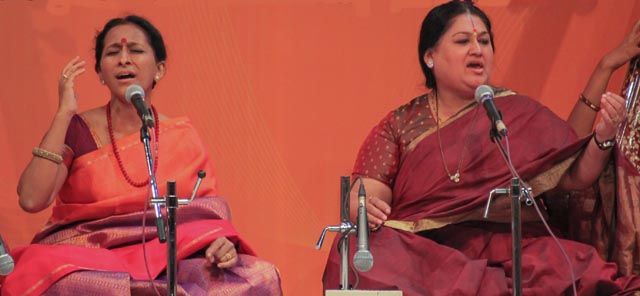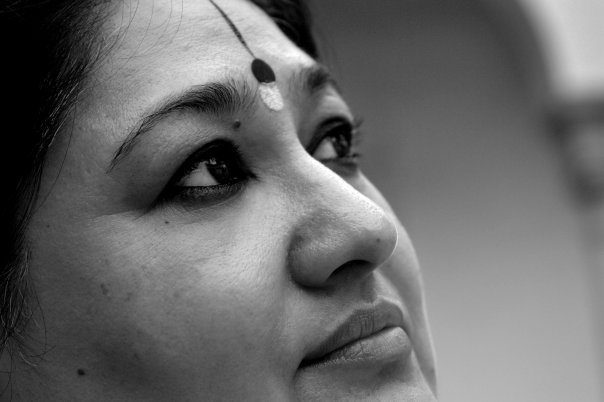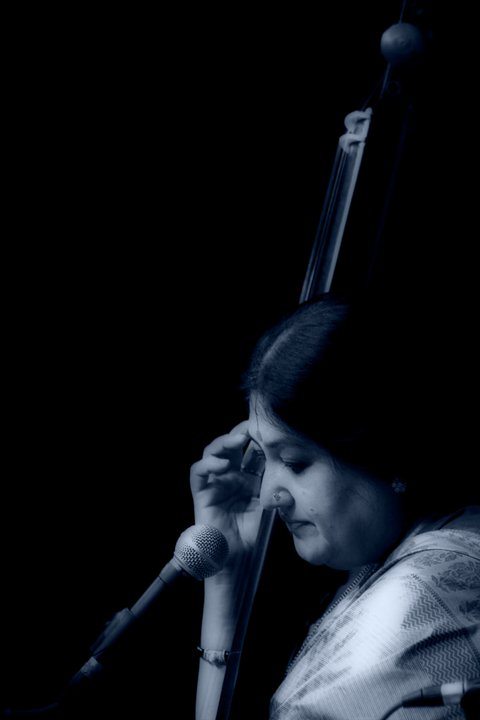
Bombay Jayashri & Shubha Mudgal – Indian Musical Heaven
Rarely do you get to see two powerful titans of North and South, of Hindustani and Carnatic music, performing together – Shubha Mudgal and Bombay Jayashri. This month they will be sharing a stage for the SAMAA concert at Town Hall on May 31, 2014 in Manhattan. What is fascinating about these two great musicians is that they have such rich backgrounds in the traditions of classical music but are always willing to try new things and also participate with western musicians. For them, everything begins and blossoms with music.
Musical Yin and Yang
Their upcoming concert has been described as “A Jugalbandi (duet), a musical dialogue between Hindustani and Carnatic styles of Indian music by iconic musicians from India. Shubha Mudgal’s clear powerful voice and Bombay Jayashri’s soft melodious voice complement each other in their jugalbandis. They are like yin and yang.”
Shubha Mudgal & Bombay Jayashri
Face to Face with Shubha Mudgal
Here, a chat with Shubha Mudgal to warm you up for the treat in store. She talks about childhood, music and life, and the experience of performing with Bombay Jayashri.

When Music is the Food of Life
What was your childhood like and how important was music in your growing up years?
I grew up in Allahabad to parents who taught English Literature at the then very prestigious University of Allahabad. My parents, though not professional musicians, were crazy about music and the arts and gave me and my sibling Ragini every possible opportunity to engage with the arts and music. We were encouraged to listen to music, attend concerts, buy tickets to the theatre, encouraged to appreciate cinema, and were also encouraged to study dance and music. A constant involvement with the arts was encouraged and no pressure was put on us to dissociate with our dance or music classes when exams were round the corner. You could say therefore, that we grew up in the companionship of the arts, and that was an important aspect of my upbringing.
I grew up learning classical music and dance, but could also hum the latest hits from films, and also sang hymns in the Catholic school where I studied. I was thus introduced to the magnificent diversity which is such an integral part of Indian culture.
I remember the songs you did for Breakthrough some years ago – have women’s issues always been very important for you?
I consider myself fortunate to have been associated with “Mann Ke Manjeere”, Breakthrough’s very first project for which I recorded 5 tracks. Women’s issues are indeed of great significance for me, but the use of music as a tool to state a point of view or send a message – that is the larger picture I believe in. As a result I have a large repertoire of songs and compositions that are related to issues of importance in society and human rights.
Shubha Mudgal’s Tribute to Women
You perform both classical and for the cinema. How much difference is there between the two and the audiences for each?
I’m afraid I have had almost no involvement with Hindi film music, barring the 4 or 5 tracks I have dubbed for films. So I don’t have a ready answer for this question!
Musical Conversation – Carnatic and Hindustani Music
Have you both ever performed together before with Bombay Jayashri? What has the experience been like?
Jayashriji and I have been performing together for several years now, although this is our first jugalbandi concert in the USA. In fact, she is the only artiste with whom I have ever performed a jugalbandi and the experience has been most satisfying.
When we first performed together several years ago, we started out by presenting individual items with our respective accompanists and only performed one or two tracks together. However, over the years we have been able to put together a large and varied jugalbandi repertoire for our concerts where we are able to celebrate both the similarities and the points of divergence in the two great classical systems of India, namely the Hindustani and Carnatic systems.
We are also fortunate that we are accompanied by some of the most accomplished musicians in India, namely Aneesh Pradhan on the tabla, Sudhir Nayak on the harmonium, Embar Kannan on the violin, and J. Vaidyanathan on the mridangam. Their presence in the ensemble permits us to present not only collaborations between Jayashriji and me, but also between the accompanying musicians. In fact, our presentations are greatly enriched by the many ideas, suggestions and compositions that each member of the ensemble offers to the collaboration.

What are the treats you have in store for those attending your concert in New York?
The concert presented by SAMAA will feature 6 musicians on stage, all eager to give their best. Our repertoire is entirely classical, and we hope therefore that it will convey the dignity, majesty, freedom of imagination and virtuosity and discipline that characterizes the Hindustani and Carnatic systems of classical music.
What has been your most memorable moment in your performing life?
To be honest, I don’t think I have had any particularly memorable occasion that I could share with you. But I have had the good fortune to have received the blessings and guidance of many great scholars and musicians in India. I feel fortunate to have been trained by eminent gurus like Pandit Ramashreya Jha “Ramrang”, Pandit Vinaya Chandra Maudgalya, Pandit Vasant Thakar, Pandit Jitendra Abhisheki, Pandit Kumar Gandharva, and Smt. Naina Devi.
That’s a memorable list of gurus isn’t it?
More details of the upcoming concert at Samaa.US
(Watch out for the interview with Bombay Jayashri! )
Related Articles:
Classical Music – the Next Generation
Being Vilayat Khan’s Son

1 Comment
Via Google +
Ami Shah and Sunil Yadav Google +2